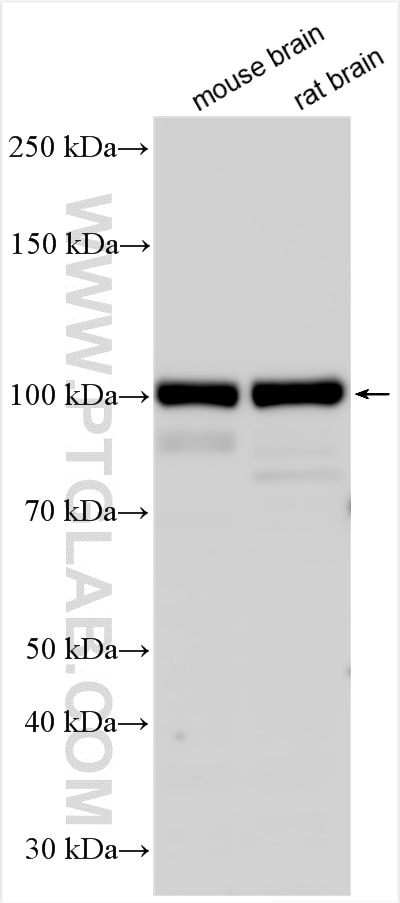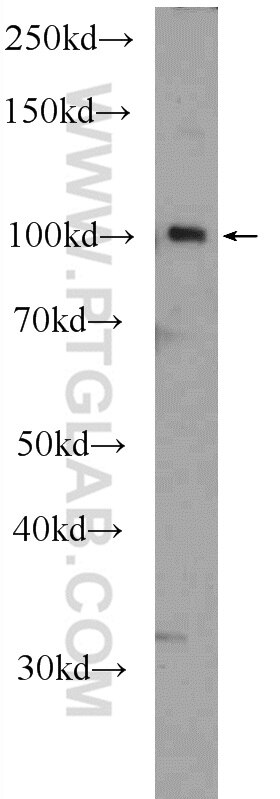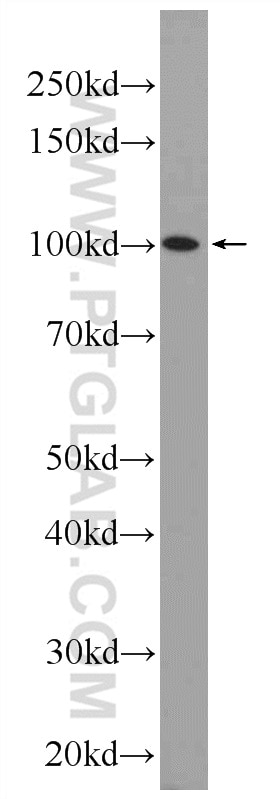SFMBT2 Polyclonal antibody
SFMBT2 Polyclonal Antibody for WB, ELISA
Host / Isotype
Rabbit / IgG
Reactivity
mouse, rat
Applications
WB, ELISA
Conjugate
Unconjugated
Cat no : 25256-1-AP
Synonyms
Validation Data Gallery
Tested Applications
| Positive WB detected in | mouse brain tissue, NIH/3T3 cells, mouse spleen tissue, rat brain tissue |
Recommended dilution
| Application | Dilution |
|---|---|
| Western Blot (WB) | WB : 1:500-1:3000 |
| It is recommended that this reagent should be titrated in each testing system to obtain optimal results. | |
| Sample-dependent, Check data in validation data gallery. | |
Product Information
25256-1-AP targets SFMBT2 in WB, ELISA applications and shows reactivity with mouse, rat samples.
| Tested Reactivity | mouse, rat |
| Cited Reactivity | mouse |
| Host / Isotype | Rabbit / IgG |
| Class | Polyclonal |
| Type | Antibody |
| Immunogen | SFMBT2 fusion protein Ag19379 |
| Full Name | Scm-like with four mbt domains 2 |
| Calculated Molecular Weight | 894 aa, 101 kDa |
| Observed Molecular Weight | 100 kDa |
| GenBank Accession Number | BC152430 |
| Gene Symbol | SFMBT2 |
| Gene ID (NCBI) | 57713 |
| RRID | AB_2833000 |
| Conjugate | Unconjugated |
| Form | Liquid |
| Purification Method | Antigen affinity purification |
| Storage Buffer | PBS with 0.02% sodium azide and 50% glycerol pH 7.3. |
| Storage Conditions | Store at -20°C. Stable for one year after shipment. Aliquoting is unnecessary for -20oC storage. 20ul sizes contain 0.1% BSA. |
Background Information
SFMBT2 (Scm like with four mbt domains 2), also named as KIAA1617. It is located in Nucleus and ubiquitous expression in thyroid and ovary. The calculated molecular weight of SFMBT2 is 100 kDa. Although mammalian SFMBTs have similar structural features with PcG protein dSFMBT, biological function and target genes of SFMBT have been not investigated well. Lee K and Na W investigated biological function of human SFMBT2 that interacted with YY1 using AR (androgen receptor)-negative DU145 prostate cancer cells. They found that human SFMBT2 represses HOXB13 gene expression via its association with methylated histones H3 and H4 that are transcriptional repression marks. Furthermore, their findings indicate that SFMBT2 may be involved in regulation of cell growth of DU145 prostate cancer cells (PMID: 23385818).
Protocols
| Product Specific Protocols | |
|---|---|
| WB protocol for SFMBT2 antibody 25256-1-AP | Download protocol |
| Standard Protocols | |
|---|---|
| Click here to view our Standard Protocols |
Publications
| Species | Application | Title |
|---|---|---|
Cell Stem Cell Overcoming Intrinsic H3K27me3 Imprinting Barriers Improves Post-implantation Development after Somatic Cell Nuclear Transfer. | ||




